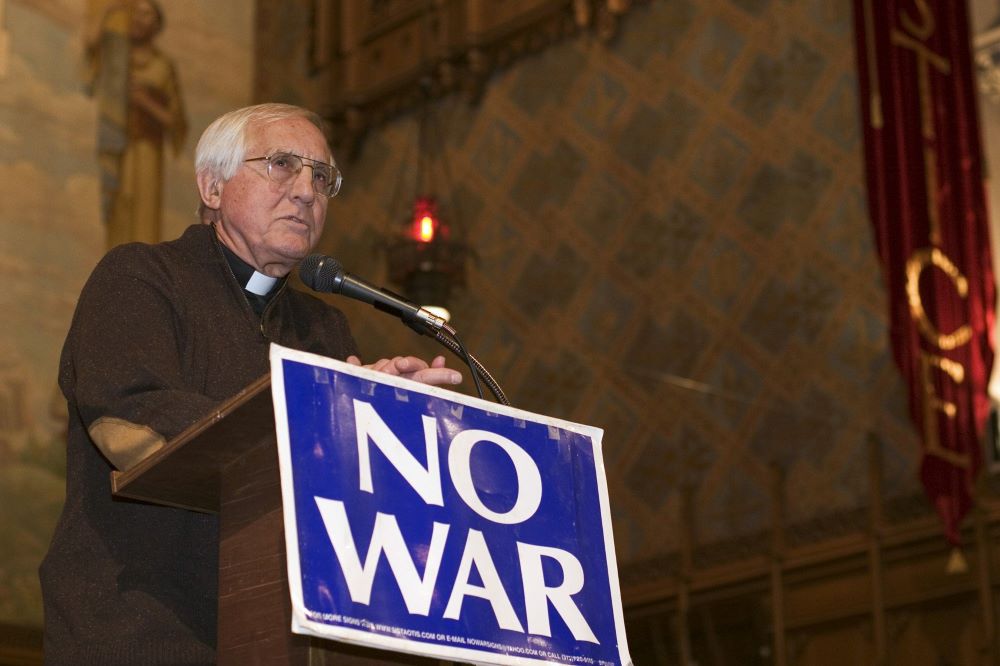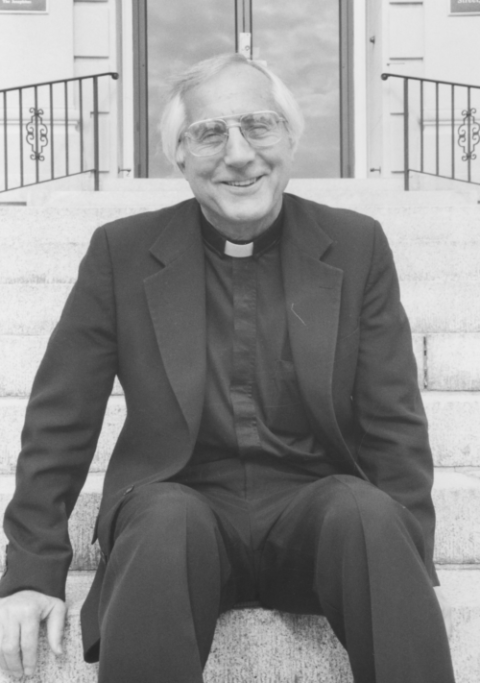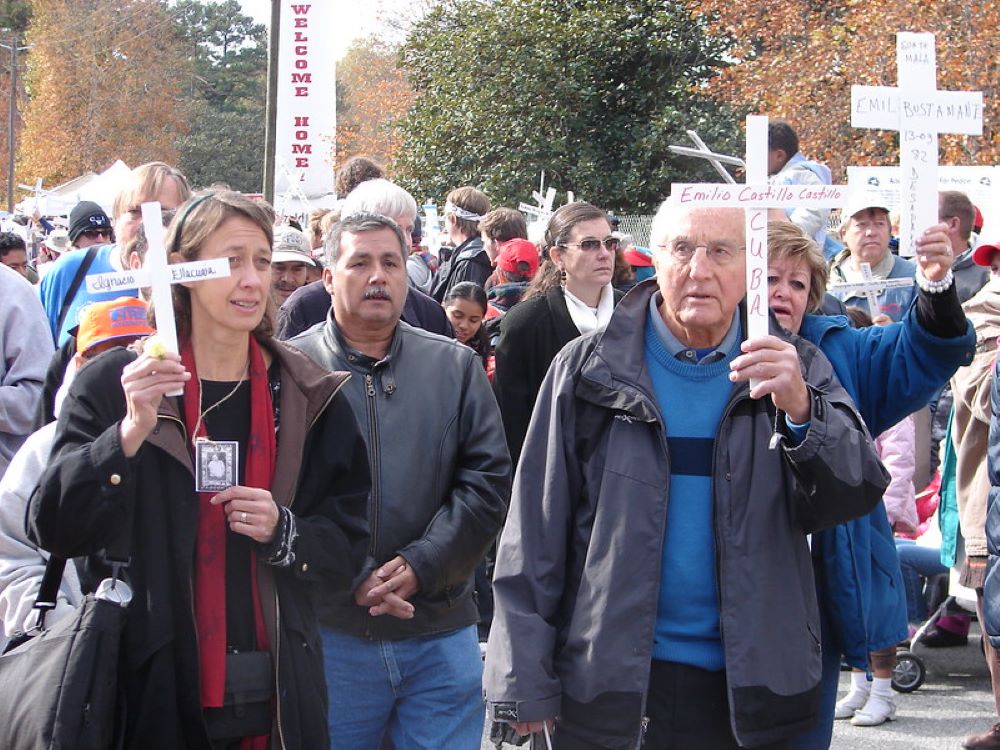
Detroit Auxiliary Bishop Thomas Gumbleton addresses several hundred antiwar activists at Central United Methodist Church in Detroit March 18, at an event marking the second anniversary of the U.S. invasion of Iraq. Gumbleton died April 4 at age 94. (CNS/Jim West)
Bishop Thomas Gumbleton, the Detroit prelate who for many American Catholics defined faith-based social justice activism in the post-Vatican II church, died April 4. He was 94.
Described sometimes as the pastor of the Catholic peace and justice movement, Gumbleton lived in Detroit nearly his entire life, yet his influence was felt in far-flung places such as El Salvador, Haiti, Vietnam, Iran and Iraq.
He was a founding member of both Pax Christi USA, the national arm of the international Catholic peace movement, and Bread for the World, an advocacy organization seeking to end world hunger.
"To put it most succinctly, Tom lived out the peace of Christ in his complete being," said Johnny Zokovitch, Pax Christi USA's executive director, shortly after the bishop's death. "Everything that our movement strives to be was evident in Tom and how Tom lived."
Immaculate Heart of Mary Sr. Irene Therese Gumbleton, the last living of nine Gumbleton siblings, said her brother passed away at a hospital in Dearborn, Michigan, following physical decline over the past week. "It means a lot to us that we've lost him," she told NCR by phone. "I think the church is really going to miss him."
Expressing care for a wide range of global issues, Gumbleton was frequently on the scene of world trouble spots. In the United States, he was arrested for civil disobedience in protests against nuclear weapons and the 2003 Iraq War.
In Central America during the 1980s, he visited El Salvador and Nicaragua, returning to the U.S. with pointed criticisms of Cold War policies backing contra guerrillas in Nicaragua and a government in El Salvador that allowed a military to trod over human rights.
While embracing a prophetic role, he could also be a churchman. He was among the authors of the U.S. bishops' landmark 1983 pastoral letter on the nuclear arms race, "The Challenge of Peace: God's Promise and Our Response," which criticized American policy but offered some justification for the Cold War system of nuclear deterrence.
By 2017, after Pope Francis changed the church's position on deterrence and declared for the first time that the "very possession" of nuclear weapons was to be "firmly condemned," Gumbleton told NCR he regretted what he wrote in 1983.

Detroit Auxiliary Bishop Thomas Gumbleton is seen in a 1995 photo. (NCR photo/Arthur Jones)
A Detroit native, Gumbleton was ordained a priest in 1956, served in Detroit-area parishes and was an archdiocesan chancery official. He was a protégé of Cardinal John Dearden, a leader who both influenced and was galvanized by the Second Vatican Council.
Ordained an auxiliary bishop in 1968 at age 38, he was the youngest U.S. bishop at the time. But Gumbleton's rapid ascent through the church hierarchy hit a dead end. He retired with the same title in 2006, having served for decades as pastor of inner-city St. Leo's Church, where he shared his rectory bathroom with worshipers and visitors.
"He never learned to speak bishop-ese," said Fr. Norman Thomas, pastor of Sacred Heart Church in Detroit and a longtime friend of Gumbleton.
In an NCR interview in December 2017, Gumbleton said that despite his quick ascent to the rank of bishop, "I never thought of myself as being on a track. I never thought of the consequences."
Gumbleton's frequent forays into political activism and candor on divisive church doctrinal issues such as women's ordination and gay rights guaranteed that he would never ascend beyond auxiliary bishop in his beloved hometown.
During an interview in the late 1960s, Gumbleton voiced candid opinions on social and church issues. He later received a friendly warning letter from Archbishop Jean Jadot, then the apostolic delegate to the U.S., suggesting that bishops stay out of controversial press interviews.
"I was shocked that Jadot would say you should back off. I didn't take his advice," said Gumbleton.
As a young chancery official, he was sent to talk with clergy and other activists opposed to the Vietnam War who had been pushing the archdiocese to do more. The goal was to see if Gumbleton could calm matters. After meeting with activists, Gumbleton himself became a convert to various social justice causes.
"By the time the evening was over I was convinced they were right and that I should protest," he recalled.

Bishop Thomas Gumbleton, who died April 4 at age 94, is pictured at a School of the Americas Watch vigil at Fort Benning, Ga., in 2008.. (Pax Christi/Johnny Zokovitch)
Gumbleton later rankled church officials for the way he acknowledged the reality of Catholic clergy sexual abuse. In 2006, he gave written testimony to Ohio state legislators revealing his own sexual abuse by a priest, and supporting an extension of the state's statute of limitations in sexual abuse cases. As a consequence, he was effectively removed from his post at St. Leo's Church and forced to retire.
Gumbleton continued to minister at local parishes and continued writing and speaking on social justice issues until his death. For years he had an NCR column featuring his homilies, called "The Peace Pulpit."
His friends said that the bishop was a natural introvert. His approach to issues was to listen, ask questions, seek advice and place himself in situations where people felt oppressed. "He wanted to be in places where it was all about economic justice," said Thomas.
Advertisement
Much of his ministry was beyond the media's notice, including visits to Michigan prisons and a medical mission he supported in Haiti.
"He epitomized the best of the Catholic tradition," said Benedictine Sr. Anne McCarthy, a former staffer at Pax Christi USA who worked with Gumbleton and traveled with him frequently on overseas trips.
Despite Gumbleton's devotion to the church, said McCarthy, "when push came to shove, he would always go for the Gospel over the institution."







